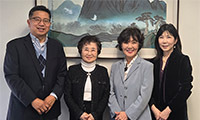▶ THOMAS L. FRIEDMAN
The Cold War was a unique event that pitted two global ideologies, two global superpowers, each with globe-spanning nuclear arsenals and broad alliances behind them. Indeed, the world was divided into a chessboard of red and black, and who controlled each square mattered to each side’s sense of security, well-being and power. It was also a zero-sum game, in which every gain for the Soviet Union and its allies was a loss for the West and NATO, and vice versa.
That game is over. We won. What we have today is the combination of an older game and a newer game. The biggest geopolitical divide in the world today “is between those countries who want their states to be powerful and those countries who want their people to be prosperous,” argues Michael Mandelbaum, professor of foreign policy at Johns Hopkins.
The first category would be countries like Russia, Iran and North Korea, whose leaders are focused on building their authority, dignity and influence through powerful states. And because the first two have oil and the last has nukes that it can trade for food, their leaders can defy the global system and survive, if not thrive — all while playing an old, traditional game of power politics to dominate their respective regions.
The second category, countries focused on building their dignity and influence through prosperous people, includes all the countries in Nafta, the European Union, and the Mercosur trade bloc in Latin America and Asean in Asia. These countries understand that the biggest trend in the world today is not a new Cold War but the merger of globalization and the information technology revolution. They are focused on putting in place the right schools, infrastructure, bandwidth, trade regimes, investment openings and economic management so more of their people can thrive in a world in which every middle-class job will require more skill and the ability to constantly innovate will determine their standard of living. (The true source of sustainable power.)
But there is also now a third and growing category of countries, which can’t project power or build prosperity. They constitute the world of “disorder.” They are actually power and prosperity sinks because they are consumed in internal fights over primal questions like: Who are we? What are our boundaries? Who owns which olive tree? These countries include Syria, Libya, Iraq, Sudan, Somalia, Congo and other hot spots. While those nations focused on state power do play in some of these countries — Russia and Iran both play in Syria — the states that are more focused on building prosperity are trying to avoid getting too involved in the world of disorder. Though ready to help mitigate humanitarian tragedies there, they know that when you “win” one of these countries in today’s geopolitical game, all you win is a bill.
Ukraine actually straddles all three of these trends. The revolution there happened because the government was induced by Russia, which wants to keep Ukraine in its sphere of influence, into pulling out of a trade agreement with the European Union — an agreement favored by the many Ukrainians focused on building a prosperous people. This split has also triggered talk of separatism by the more Russian-speaking and Russian-oriented eastern part of Ukraine.
So what do we do? The world is learning that the bar for U.S. intervention abroad is being set much higher. This is due to a confluence of the end of the Soviet Union’s existential threat, the experience of investing too many lives and $2 trillion in Iraq and Afghanistan to little lasting impact, America’s rising energy independence, our intelligence successes in preventing another 9/11 and the realization that to fix what ails the most troubled countries in the world of disorder is often beyond our skill set, resources or patience.
In the Cold War, policy-making was straightforward. We had “containment.” It told us what to do and at almost any price. Today, Obama’s critics say he must do “something” about Syria. I get it. Chaos there can come around to bite us. If there is a policy that would fix Syria, or even just stop the killing there, in a way that was self-sustaining, at a cost we could tolerate and not detract from all the things we need to do at home to secure our own future, I’m for it.
But we should have learned some lessons from our recent experience in the Middle East: First, how little we understand about the social and political complexities of the countries there; second, that we can — at considerable cost — stop bad things from happening in these countries but cannot, by ourselves, make good things happen; and third, that when we try to make good things happen we run the risk of assuming the responsibility for solving their problems, a responsibility that truly belongs to them.
스마터리빙
more [ 건강]
[ 건강]이제 혈관 건강도 챙기자!
[현대해운]우리 눈에 보이지 않기 때문에 혈관 건강을 챙기는 것은 결코 쉽지 않은데요. 여러분은 혈관 건강을 유지하기 위해 어떤 노력을 하시나요?
 [ 건강]
[ 건강]내 몸이 건강해지는 과일궁합
 [ 라이프]
[ 라이프]벌레야 물럿거라! 천연 해충제 만들기
 [ 건강]
[ 건강]혈압 낮추는데 좋은 식품
[현대해운]혈관 건강은 주로 노화가 진행되면서 지켜야 할 문제라고 인식되어 왔습니다. 최근 생활 패턴과 식생활의 변화로 혈관의 노화 진행이 빨라지고
사람·사람들
more
[화제] 유도 미 국가대표 3형제… “LA 올림픽 금메달 위해 구슬땀”
3형제가 나란히 미국 국가대표로 활약하고 있어 화제다. 조슈아 양(22·-60kg급), 제이콥 양(20·-66kg급), 조나단 양(18·-60…

연세대 남가주 동문회… “61주년 맞아 새로운 도약”
연세대학교 남가주 동문회 제50대 회장으로 취임한 권기숙 회장이 신임 회장단과 함께 본보를 방문해 향후 동문회 운영 방향과 비전을 밝혔다. 1…
LA 북부한인회, 글렌데일 시청서 ‘한인의 날’
LA 북부한인회(회장 박승목)는 미주 한인 이민 123주년 기념 ‘미주 한인의 날’을 맞아 지난 13일 글렌데일 시청에서 열린 한인의 날 선포…
‘전통 실크등의 아름다움’
LA 한국문화원이 경상남도 진주시와 함께 ‘한국의 빛: 진주 실크등 전시회’를 1월15일부터 2월28일까지 개최한다고 밝혔다. 이번 전시는 문…
코윈 퍼시픽 LA 신년회·이사장 취임식
세계한민족여성네트워크(KOWIN) 퍼시픽 LA 지부(회장 조미순)는 지난 7일 LA 용수산에서 신년회 및 이사장 취임식을 개최했다. 참석자들은…
많이 본 기사
- 박나래 ‘전 남친’ 정체, 직접 밝혔다
- 주택가 공놀이에 벌금·징역까지?
- 버라이즌 통신망 ‘먹통’ LA 등 한때 서비스 장애
- 트럼프, ‘피난처’ 지자체에 “연방 지원금 끊겠다”
- 75개국 대상 이민비자 ‘전면 중단’
- LA “단속 요원 오지마” ‘ICE … 1
- 붉은 고기, 얼마나 먹어야 안전할까?… 전문가들 조언은
- 사기 피해 방지하려면… 시도 때도 없이 걸려오는 스팸 전화·문자 ‘심각’
- 한인타운 다울정 인근 ‘보행자 친화 거리’ 된다
- ‘12살 연하♥’ 신정환, 가석방 3년 만에 결혼.. “혼전임신이었다” 고백
- 워싱턴 인사이트… 올 중간선거 연방의회 ‘대폭 물갈이’ 예고
- 선 넘은 스타벅스 직원 경찰에 ‘돼지 그림’ 해고
- ICE 요원 총격 관련 연방검사들 줄사직
- ‘장동건♥’ 고소영, 노안 고백 “돋보기 목에 걸고 다녀..슬픈 현실”
- ‘현빈♥’ 손예진, 가족과 생일 파티..子 목소리 공개 “후 불어야지”
- 한인 주점서 총격살인극 용의자 2개월 만에 체포
- 잔나비, ‘학폭’ 유영현 탈퇴 7년만 근황 공개..피해자와 화해했다
- ‘환율·반미정서·고비용’ 미국 관광산업 ‘된서리’
- 장동혁, 한동훈 제명 의결 잠시 멈췄지만…국힘 내홍 ‘일촉즉발’
- 아시아나, ‘인천공항 제2터미널 시대’ 개막
- 이소룡 기념 우표 나온다… 내달 첫 공개 행사
- 모기지 보험료 인하·다운페이… 올해 알아 둘 보조 프로그램
- 올해 ‘한인의 날’도 큰 축하 받아...13일 시애틀총영사관서 제19회 기념식 성공리에 열려
- [화제] 유도 미 국가대표 3형제… “LA 올림픽 금메달 위해 구슬땀”
- “뉴욕주민 생활비 부담 확 줄이겠다” 2
- 미, 그린란드 사려면 얼마에? “전문가들 최대 7천억불 제시”
- [여명] 망국병 ‘진영 논리’ 1
- 이준구 사범 1월 ‘이달의 재외동포’
- [지평선] 조롱받는 72만 ‘쉬었음 청년’
- 모기지 금리 인하와 주택 시장의 변곡점
- 방 하나 임대해볼까?
- 타운 인근 세인트 빈센트 병원, 홈리스 지원센터로
- 태국 고속철 공사장 열차 탈선… 최소 25명 사망
- 북VA 남성, 명품시계 가로채려다 경찰에 덜미
- 맘다니,“뉴욕시에 대한 공격”석방 촉구
- 연세대 남가주 동문회… “61주년 맞아 새로운 도약”
- 미, 개입 임박했나… “카타르 미군기지 일부 철수 권고”
- LA 레이커스, 애틀랜타 완파하고 3연패 탈출
- 이민진 작가 새 장편 ‘아메리칸 학원’ 출간
- [로터리] 시간을 담그는 문화, 한국의 장
- [윌셔에서] 숲의 숨으로
- 현대 팰리세이드, ‘2026 북미 올해의 유틸리티 차량(North American Utility Vehicle of the Year™)’ 선정
- 아시아나항공, 인천 제2 터미널로 이전
- 삭스백화점, 파산보호 매장은 정상 운영계획
- 주거 공간만으론 부족… 신체·정신적 건강까지 챙겨야
- 클로이 김, 어깨 부상에도 올림픽 출전 선언
- ‘2026 북미 올해의 유틸리티 차량’ 선정
- [김스전기] “차원 높은 조리 경험, 알텐바흐 독일 명품 저압냄비”
- 가주 ‘발의안 50’ 선거구 재조정 확정
- [한영의 독서칼럼] 햇살을 향해 헤엄치기
1/5지식톡

-
 한국 안경을 무료 배송으로 받아보실…
0
한국 안경을 무료 배송으로 받아보실…
0안녕하세요. 서울 안암동에 위치한 ‘보고싶다 안경원’입니다.저희는 다년간 한국 고객분들께 착용감 좋은 안경테와 한국안경브랜드,고압축 도수 렌즈를 합리적인 가격에 제공해온 안경 전문점입니다.이번에 해외 배송이 가능해…
-
 미 육군 사관학교 West Poin…
0
미 육군 사관학교 West Poin…
0https://youtu.be/SxD8cEhNV6Q연락처:wpkapca@gmail.comJohn Choi: 714-716-6414West Point 합격증을 받으셨나요?미 육군사관학교 West Point 학부모 모…
-
 ☝️해외에서도 가능한 한국어 선생님…
0
☝️해외에서도 가능한 한국어 선생님…
0이 영상 하나면 충분합니다!♥️상담신청문의♥️☝️ 문의 폭주로 '선착순 상담'만 진행합니다.☎️ : 02-6213-9094✨카카오톡ID : @GOODEDU77 (@골뱅이 꼭 붙여주셔야합니다…
-
 테슬라 자동차 시트커버 장착
0
테슬라 자동차 시트커버 장착
0테슬라 시트커버, 사놓고 아직 못 씌우셨죠?장착이 생각보다 쉽지 않습니다.20년 경력 전문가에게 맡기세요 — 깔끔하고 딱 맞게 장착해드립니다!장착비용:앞좌석: $40뒷좌석: $60앞·뒷좌석 …
-
 식당용 부탄가스
0
식당용 부탄가스
0식당용 부탄가스 홀세일 합니다 로스앤젤레스 다운타운 픽업 가능 안녕 하세요?강아지 & 고양이 모든 애완동물 / 반려동물 식품 & 모든 애완동물/반려동물 관련 제품들 전문적으로 홀세일/취급하는 회사 입니다 100% …
케이타운 1번가
오피니언
 한 영 재미수필가협회 회장
한 영 재미수필가협회 회장 [한영의 독서칼럼] 햇살을 향해 헤엄치기
 이규민 한식진흥원 이사장
이규민 한식진흥원 이사장 [로터리] 시간을 담그는 문화, 한국의 장
 이상훈 서울경제 정치부장
이상훈 서울경제 정치부장 [여명] 망국병 ‘진영 논리’
 허경옥 수필가
허경옥 수필가 [윌셔에서] 숲의 숨으로
 이영태 / 한국일보 논설위원
이영태 / 한국일보 논설위원 [지평선] 조롱받는 72만 ‘쉬었음 청년’

[왈가 왈부] 김경·강선우 뒷북 출금… ‘수사 뭉개기’ 의심 살 만하네요
 정숙희 논설위원
정숙희 논설위원새로 나온 이상한 식품 피라미드
 데이빗 이그나티우스 워싱턴포스트 칼럼니스트
데이빗 이그나티우스 워싱턴포스트 칼럼니스트 [데이빗 이그나티우스 칼럼] 그린란드에 대한 트럼프의 위험한 집착
 김동찬 시민참여센터 대표
김동찬 시민참여센터 대표 [미국은 지금] 침팬지의 그루밍과 인간의 민주주의
1/3지사별 뉴스

“뉴욕주민 생활비 부담 확 줄이겠다”
▶ 자동차·주택 보험료, 공공요금 인하뉴욕주가 무상보육 확대와 임차인 보호, 공공요금 규제 강화 등을 올해 주요 역점 정책으로 정하고 뉴욕주민…
‘내란 우두머리’ 윤 전 대통령에 사형 구형

연방의회서 “한인 위상·한미동맹 제고” 한목소리
한인 이민자들이 미국에 도착한 123주년을 기념하고 한인들의 미국 사회에의 기여를 알리는 ‘제 21회 미주 한인의 날’ 행사가 13일 연방의회…
한국학교 방향성 재정립 모색

트럼프 “美시민에 사기친 귀화 이민자, 국적 불문 시민권 박탈”
도널드 트럼프 대통령은 13일 “소말리아든 어디 출신이든, 귀화 이민자 중 우리 시민들을 상대로 사기를 쳐 유죄 판결을 받으면 시민권을 박탈할…
SF 기독대학교 ‘성장 발전’ 기대



















































.png)


댓글 안에 당신의 성숙함도 담아 주세요.
'오늘의 한마디'는 기사에 대하여 자신의 생각을 말하고 남의 생각을 들으며 서로 다양한 의견을 나누는 공간입니다. 그러나 간혹 불건전한 내용을 올리시는 분들이 계셔서 건전한 인터넷문화 정착을 위해 아래와 같은 운영원칙을 적용합니다.
자체 모니터링을 통해 아래에 해당하는 내용이 포함된 댓글이 발견되면 예고없이 삭제 조치를 하겠습니다.
불건전한 댓글을 올리거나, 이름에 비속어 및 상대방의 불쾌감을 주는 단어를 사용, 유명인 또는 특정 일반인을 사칭하는 경우 이용에 대한 차단 제재를 받을 수 있습니다. 차단될 경우, 일주일간 댓글을 달수 없게 됩니다.
명예훼손, 개인정보 유출, 욕설 등 법률에 위반되는 댓글은 관계 법령에 의거 민형사상 처벌을 받을 수 있으니 이용에 주의를 부탁드립니다.
Close
x